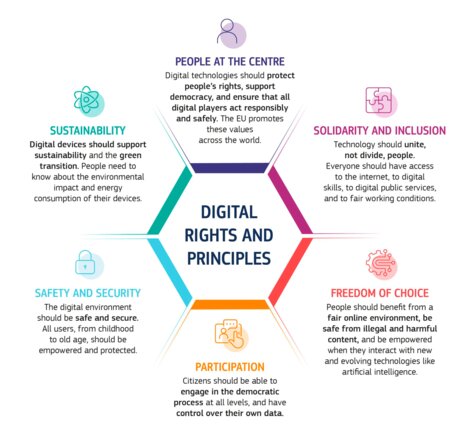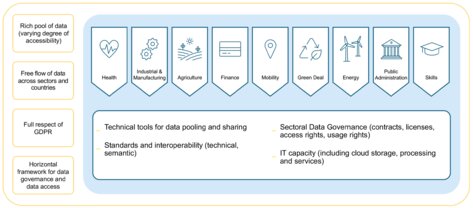 Getty Images/grafvision
Getty Images/grafvision
Digital Decade and social protection
ed* Nr. 01/2024 – Chapter 3
In addition to climate change, the digital transformation across Europe must also be managed. The Digital Decade programme, which was adopted at the end of 2022, aims to ensure that at least 80 per cent of people in the EU have basic digital skills by 2030. At least 75 per cent of all companies are expected to use AI, big data or clouds. Special focus of the programme is on the digitalisation of public services.
Digital Rights and Principles

Significant progress was made in the area of social security during the last legislative period. Since May, all intergovernmental processes of the social insurance agencies have been handled EU-wide via the Electronic Exchange of Social Security Information (EESSI). The Single Digital Gateway to public administration is online. Together with the regulation for a European Digital Identity, which is to be fully implemented by 2026, the course has been set for a European Social Security Pass (ESSPASS). This is intended to enable mobile workers to access important administrative documents throughout the EU and use them in their everyday dealings with the authorities. Mobility and thus the free movement of people in the EU are digitally supported in this way.
The digitalisation of social security strengthens the single market
Digitalisation will certainly continue to be a high priority in the new parliamentary term. This is shown not least by the electoral manifestos of the major European political groups. The Christian Democrats (EPP), Liberals (ALDE), Greens (EGP) and Left (EL) want to advocate for the regulation and protection of workers’ rights in the digital age, promote the digitalisation of the healthcare system, intensify imparting of digital skills (ALDE) or promote research into AI-based methods in health prevention and treatment or labour mobility through the ESSPASS (EPP). Two pilot projects are currently in progress for the latter, which are to lay the foundations for the A1 certificate for posted workers and thereafter the European Health Insurance Card (EHIC) to be used electronically by April 2025. The German Federal Pension Insurance (Deutsche Rentenversicherung Bund) and the National Association of Statutory Health Insurance Funds (GKV-Spitzenverband) are also actively involved here, along with numerous other social insurance organisations from Europe. The DSV believes that the digitalisation of social security must be consistently implemented in order to further develop the coordination of social security systems and thus the free movement of workers in a citizen-friendly manner as well as to strengthen the single market.

Foster vocational programmes to urgently upskill key professions, in areas such as manufacturing, education, cybersecurity, healthcare, and agriculture with digital know-how, to accelerate the digital transition and increase competitiveness.
Digitalisation will not be able to resolve the conflict over the “883”
Digitalisation will certainly help to defuse the controversy surrounding the reform of the regulation on the coordination of social security systems – the “883” in short. However, it will not fully resolve the substantive disagreement. After consensus could not be reached on the reform in 18 trialogues, further course of action remains to be seen. Inaction is not an option. The DSV has issued repeated warnings: cross-border employees and companies need modern legislation on the coordination of social security. It would be unacceptable if a dispute over a few points – primarily the exceptions to the advance notification of the A1 certificate and the legal structure of unemployment benefits in the case of cross-border job searches – were to result in the loss of essential, settled compromises, such as the handling of cross-border care services. A solution must be sought with high priority.
European Health Data Space (EHDS)
The next major digital project is at the ready. Following just over two years of negotiations, the political compromise on the European Health Data Space from March 2024 will come into force at the end of the year. This will give an enormous boost to the utilisation of health data and improve medical care for citizens – also across borders. The protection of sensitive health data has long been the subject of debate that was important in order to gain confidence in this significant healthcare project. As a result, each individual will be able to decide whether or not to authorise the use of their health data.
Common European Data Spaces


